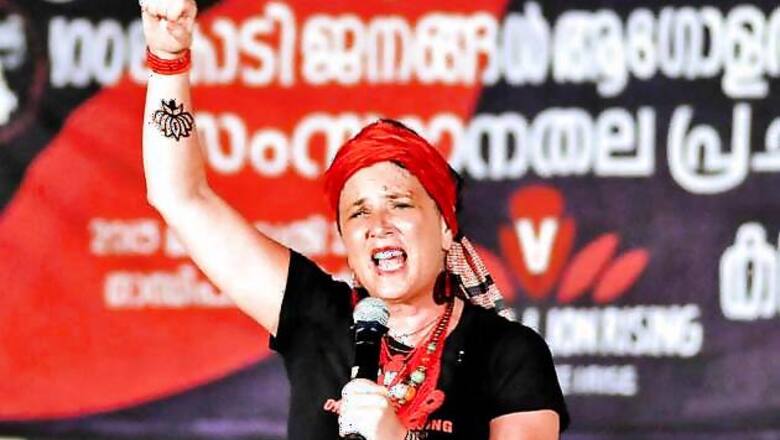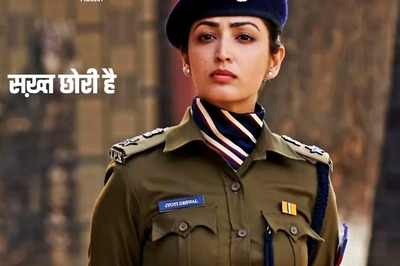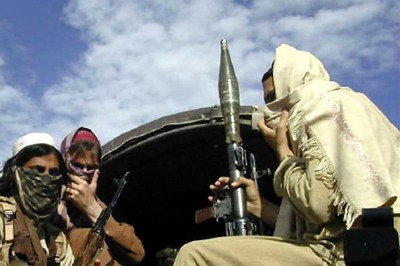
views
Save the Children's advocacy and policy director Shireen Vakil Miller joined IBNLive readers for an interaction on what the world expects from the One Billion Rising movement.
Q. What change do you think that "One billion Rising movement" could bring? According to me it will be just another day in this calender year. The crime/exploitation against women can only be stopped through humanism which should grow from the birth or enforcing deadly punishments like in Gulf. Even after Nirbhaya's case, gang rapes did happen despite of strike in Delhi. According to me it is in the hands of law. Asked by: deepak krishnamurthy
A. One of the biggest challenges to this problem of crime/exploitation of women is the lack of awareness among both men and women about how women need to be treated today, at homes, in society and as citizens of the country. This may be a day in the calendar but it provides an opportunity to all of us - men, women and children - to participate and join the movement to make change 'happen'. Every individual, especially women, get/s a chance to demand freedom from exploitation and also to stand up for those affected by such violence and exploitation.
Q. What do you think are the three top things women need to do to address gender inequality? Asked by: sakshi
A. Self awareness among women. Understanding of the need to stand up against exploitation, which is often hidden. And to help others to understand, stand up and be motivated to fight against injustice!
Q. You being a woman, do you think that pub culture has affected the safety of women/young teen girls these days? Asked by: deepak krishnamurthy
A. Irrespective of the location and time, the safety of women is of prime importance. We are trying to create a world that is equal and fair for both men and women - a world where a woman can exercise her choices as much as a man does. It's always easy (and so incorrect!) to talk about places like pubs to escape the real problems that exist only the mind!
Q. What will be the agenda of "One billion Rising Movement"? Will it be just to create an awareness on gender inequality? or Addressing the law to enforce strict rules for crime/exploitation against women? Asked by: deepak krishnamurthy
A. The campaign is inviting ONE BILLION women and those who love them (across the world, including India of course) to WALK OUT, DANCE, RISE UP, and DEMAND an end to the violence. This is a giant step which will provide further impetus and urgency to the scores of organisations influencing policy changes impacting women and girls in the country, and across the world.
Q. Do you think religion can influence this movement? Are any religious leaders supporting it? Asked by: allahuram
A. Though in Indian culture and in other cultures too, religion has a huge influence on people's lives, One Billion Rising is about individual and collective action including groups cutting across religions, culture, caste and creed, nationality, sexual orientation.
Q. What exactly does the movement want? Asked by: Anuj
A. The movement wants people like you and me to come together this Valentine's Day and celebrate the need to amplify the power of women. It's a day in the calendar when we can all focus on this issue and heighten awareness about what needs to be done and can be done if only we put our hearts and minds together this V day, as a part of One Billion Rising.
Q. It's a sigh that India being one of the leading countries in the records for crime against women which portrays its political imbalance. Do you believe in strong change in administration? Asked by: deepak krishnamurthy
A. The responsibility includes good governance but at the same time, the responsibility extends to each one of us, no one can escape this or pass the blame anymore. True, in India, we have a poor record in this area but this only means that we have to do much more than many other parts of the world, where things may not be as bad as they are here. The December incident in Delhi was a recent reminder to wake up and take action because we have reached the limit.
Q. What is your experience of discrimination against girls as a child rights organisation? Asked by: John faun
A. Girls from disadvantaged families face both deprivation and discrimination. Because of the deeply patriarchal setting of an average Indian household, boys are often given extra care and attention, whether it is giving them more freedom and importance, education, or food and nutrition. Often girls are not sent to school and are made to do house work from an early age. Families tell us that they are 'preparing' the girl for marriage. Thousands of girls are still married off when they should be in school, making them more vulnerable to violence and abuse. Child marriages occur more frequently in South Asia than in any other region of the world. We have seen that discrimination and violence starts even before birth, with an alarming rise in female foeticide in the last decade. What is even more perplexing is that sex-selective abortions have increased among the more educated and economically better-off Indians in relatively wealthy states such as Delhi, Punjab, Maharashtra (which includes India's financial capital, Mumbai) and Haryana, according to a Lancet study. Nearly 3 million girls, 1 million more than boys, were "missing" in 2011 compared to 2001 and there are now 48 fewer girls per 1,000 boys than there were in 1981 according to the Central Statistical Organisation. In Asia, and particularly in South Asian countries, a girl child is seen as a burden on the family; the birth of a girl is a cause for lament, rather than a celebration. These huge numbers of missing girls highlights a culture where far too often girls and women are seen, and treated, as inferior.
Q. How severe is the issue of violence against the girl child in India...I mean those who are allowed to be born in the first place? Asked by: Anirban
A. Please see the previous reply 'What is your experience of...'. I have given a detailed reply there already. :)
Q. Women always had problems in this country. To start from sati system, dowry, aborting female child before its birth and now insecurity. Don't you think that we are so late in addressing issues. As said "Prevention is better than cure", Myself on behalf of all men in this country strongly adore your strong step to motivate gender equality irrespective of religion, race, caste and nationality through this movement. Asked by: deepak krishnamurthy
A. Yes, thank you so much for your support and action. As the Chinese philosopher Laozi said, "A thousand mile march also begins with a single step", let this be a giant step towards a world where girls and women are treated equally and without violence.
Q. Do you think that erotic portrayal of women/girls in movies today where they have been used as a show-piece have some role in this prospect of exploitation? Asked by: deepak krishnamurthy
A. The sexual representation in Indian culture is not new - it's been there for centuries (namely Kama Sutra and erotic sculptures). Actors portraying women in 'exploited' situations, as you call it, are doing so of their own choice. It is the expectation that viewers, men and women, have created for film makers to use - which needs to be addressed and changed.
Q. Shouldn't we inculcate the children right from childhood on the equality and status of woman in today's world? Be it in homes or school, unless we change our mindsets, and adopt the change from home / school, will there be any change at all? Asked by: EMathew
A. Much of what happens is due to social conditioning, which this campaign seeks to address. While laws need to be strengthened, and even more importantly strictly enforced, what is equally important is education -- both formal, and also within homes. Parents need to treat boys and girls equally; boys need to be taught to treat girls equally.
Q. I live in Delhi and want to know where I can join this protest? Asked by: Pragya
A. Please visit http://onebillionrising.org/page/s/one-billion-rising-pledge. Thank you all - I am signing off now. Rise up on V Day!




















Comments
0 comment